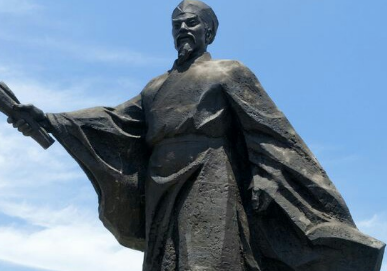Zeng Gong was a politician, literati, and historian during the Northern Song Dynasty. He was diligent in political affairs throughout his life, honest and upright in his duties, and deeply concerned about the welfare of the people. He was known as one of the "Seven Zengs of Nanfeng", along with Zeng Zhao, Zeng Bu, Zeng Yu, Zeng Hong, Zeng Xie, and Zeng Dun.

Zeng Gong's achievements in literature were outstanding. His writing style was described as "ancient, elegant, and harmonious", and he was known as "Mr. Nanfeng". He was listed among the Eight Great Literary Figures of the Tang and Song Dynasties. As an important figure in the Neo-Classical Movement of the Song Dynasty, he advocated the integration of moral principles and literary expression, and was influenced by the literary thoughts of Sima Qian and Han Yu. His articles were praised for being "eloquent without being verbose, profound without being obscure, and unique in their own way".
Zeng Gong also attached great importance to education and talent cultivation. He established the "Xinglu Academy" next to his residence in Fuzhou and personally set the academic regulations and taught there, promoting the study atmosphere in Fuzhou. In Nanfeng, there are places related to Zeng Gong such as the "Zigu Park", where he studied as a child, including the "Reading Cave", the "Tomb of Mr. Zeng Wen Ding", the "Yangfeng Pavilion", and the "Sixian Hall". The county museum is also located here. There is also a "Zigu Road" in Nanchang City, which was named in honor of Zeng Gong by later generations.
Zeng Gong's literary achievements were extensive, particularly in his prose writing. He participated in the poetic and literary reform movement led by Ouyang Xiu. His prose covered a wide range of topics, expressing profound meanings with a relaxed rhythm and sincere emotions. His themes were clear, his reasoning was orderly, and he was skilled in refining his sentences. His language was pure and clean, and he was particularly good at using parallel and antithetical sentences.
In addition to his literary achievements, Zeng Gong was also an excellent filial son and a good brother who took care of his younger siblings during difficult times. After the death of his father, he provided support and assistance to his four younger brothers and nine sisters, including helping his sister "Huan Xue" to get married satisfactorily.
Zeng Gong's influence transcended his own era. His poems and essays were translated into English and distributed abroad. His writing style was highly regarded by later generations and promoted by many literary figures and scholars.
Disclaimer: The above content is sourced from the internet and the copyright belongs to the original author. If there is any infringement of your original copyright, please inform us and we will delete the relevant content as soon as possible.
































